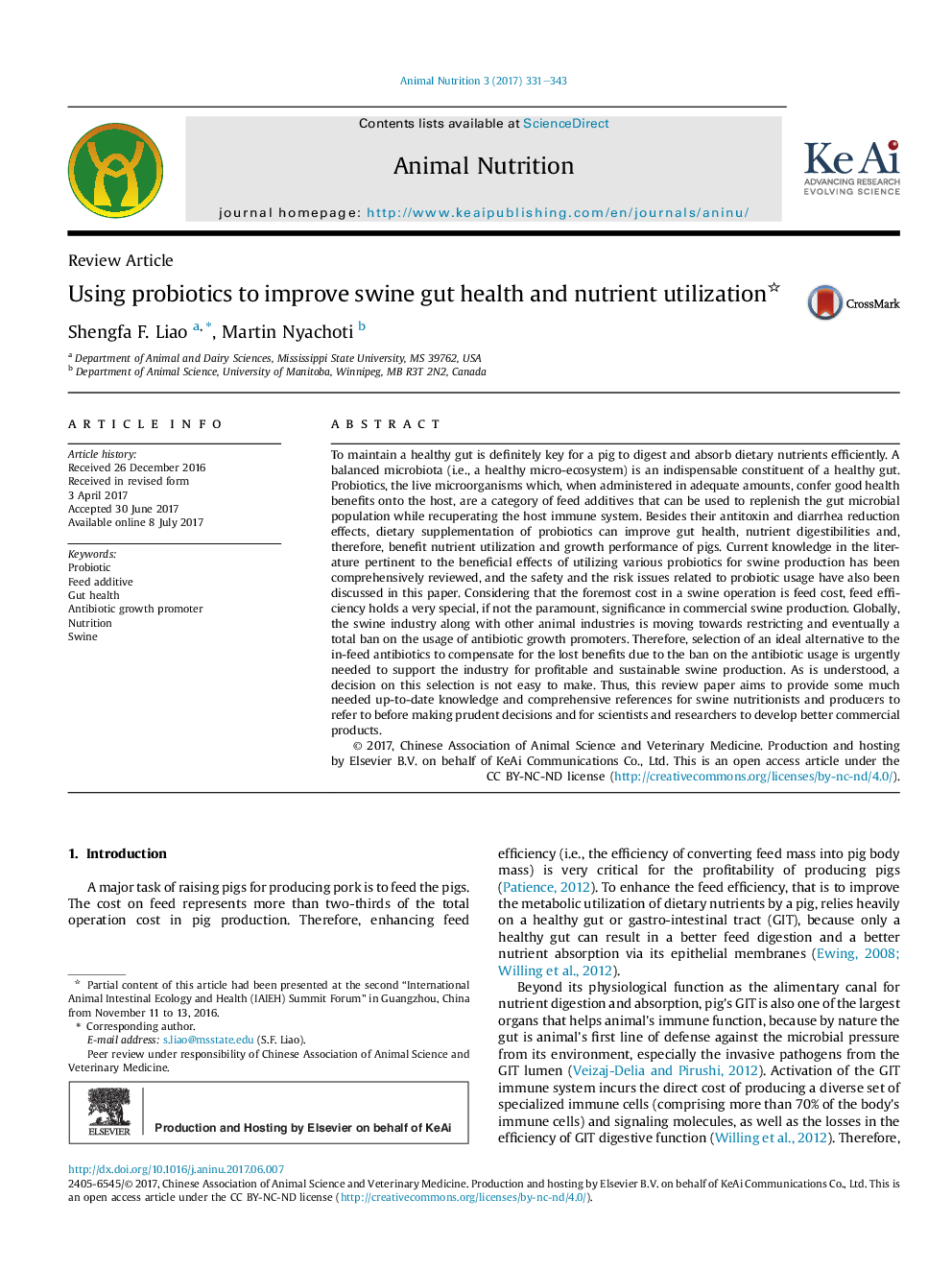| کد مقاله | کد نشریه | سال انتشار | مقاله انگلیسی | نسخه تمام متن |
|---|---|---|---|---|
| 8882529 | 1625234 | 2017 | 13 صفحه PDF | دانلود رایگان |
عنوان انگلیسی مقاله ISI
Using probiotics to improve swine gut health and nutrient utilization
ترجمه فارسی عنوان
استفاده از پروبیوتیک برای بهبود سلامت روده و مواد مغذی خوک
دانلود مقاله + سفارش ترجمه
دانلود مقاله ISI انگلیسی
رایگان برای ایرانیان
کلمات کلیدی
پروبیوتیک افزودنی خوراک، سلامت روده، پروموتر رشد آنتی بیوتیک، تغذیه، سوسیس،
ترجمه چکیده
برای حفظ روح سالم قطعا کلید برای خوک هضم و جذب مواد غذایی رژیم غذایی موثر است. یک میکروبیوتایپ متعادل (یعنی یک میکرو اکوسیستم سالم) یکی از اجزای ضروری یک روده سالم است. پروبیوتیک ها، میکروارگانیسم های زنده هستند که وقتی که در مقادیر کافی مصرف می شوند، مزایای سلامتی خوبی بر میزبان می گذارند، یک دسته از مواد افزودنی خوراکی هستند که می توانند برای تکمیل جمعیت میکروبی روده در هنگام بهبودی سیستم ایمنی میزبان استفاده شوند. علاوه بر اثرات کاهش آنتی اکسیدان و اسهال، مکملهای غذایی پروبیوتیک میتوانند سلامت روده را بهبود بخشیده و هضم مواد مغذی را بهبود بخشیده و از این طریق برای استفاده از مواد مغذی و عملکرد رشد خوکها مفید باشند. دانش فعلی در ادبیات مربوط به اثرات مفید استفاده از پروبیوتیک های مختلف برای تولید گوشت خوک به طور جامع مورد بررسی قرار گرفته است، و همچنین مسائل مربوط به ایمنی و ریسک مربوط به استفاده از پروبیوتیک در این مقاله مورد بحث قرار گرفته است. با توجه به اینکه هزینه اصلی در عملیات خوک در هزینه های خوراکی است، بازده خوراک دارای اهمیت ویژه ای است اگر نه مهم ترین در تولید خوک های تجاری. در سطح جهانی، صنایع گوشت خوک و سایر صنایع حیوانی به سمت محدود کردن و در نهایت ممنوعیت استفاده کامل از مولکول های رشد آنتی بیوتیک حرکت می کنند. بنابراین، انتخاب یک جایگزین ایده آل برای آنتی بیوتیک های خوراکی برای جبران مزایای از دست رفته ناشی از ممنوعیت استفاده از آنتی بیوتیک ضروری است تا از صنعت برای تولید خوک های سودآور و پایدار پشتیبانی شود. همانطور که درک می شود، تصمیم گیری در مورد این انتخاب آسان نیست. بنابراین، این مقاله مقدماتی، هدف از ارائه دانش و اطلاعات جامع و جامع برای متخصصان تغذیه و تولیدکنندگان گوشتخواران است تا قبل از اتخاذ تصمیمات احمقانه و برای دانشمندان و محققین جهت توسعه محصولات تجاری بهتر، به آنها مراجعه نمایند.
موضوعات مرتبط
علوم زیستی و بیوفناوری
علوم کشاورزی و بیولوژیک
علوم دامی و جانورشناسی
چکیده انگلیسی
To maintain a healthy gut is definitely key for a pig to digest and absorb dietary nutrients efficiently. A balanced microbiota (i.e., a healthy micro-ecosystem) is an indispensable constituent of a healthy gut. Probiotics, the live microorganisms which, when administered in adequate amounts, confer good health benefits onto the host, are a category of feed additives that can be used to replenish the gut microbial population while recuperating the host immune system. Besides their antitoxin and diarrhea reduction effects, dietary supplementation of probiotics can improve gut health, nutrient digestibilities and, therefore, benefit nutrient utilization and growth performance of pigs. Current knowledge in the literature pertinent to the beneficial effects of utilizing various probiotics for swine production has been comprehensively reviewed, and the safety and the risk issues related to probiotic usage have also been discussed in this paper. Considering that the foremost cost in a swine operation is feed cost, feed efficiency holds a very special, if not the paramount, significance in commercial swine production. Globally, the swine industry along with other animal industries is moving towards restricting and eventually a total ban on the usage of antibiotic growth promoters. Therefore, selection of an ideal alternative to the in-feed antibiotics to compensate for the lost benefits due to the ban on the antibiotic usage is urgently needed to support the industry for profitable and sustainable swine production. As is understood, a decision on this selection is not easy to make. Thus, this review paper aims to provide some much needed up-to-date knowledge and comprehensive references for swine nutritionists and producers to refer to before making prudent decisions and for scientists and researchers to develop better commercial products.
ناشر
Database: Elsevier - ScienceDirect (ساینس دایرکت)
Journal: Animal Nutrition - Volume 3, Issue 4, December 2017, Pages 331-343
Journal: Animal Nutrition - Volume 3, Issue 4, December 2017, Pages 331-343
نویسندگان
Shengfa F. Liao, Martin Nyachoti,
